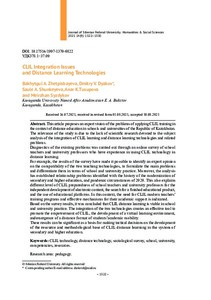CLIL Integration Issues and Distance Learning Technologies
Скачать файл:
URI (для ссылок/цитирований):
https://elib.sfu-kras.ru/handle/2311/144199Автор:
Zhetpisbayeva, Bakhytgul A.
Dyakov, Dmitry V.
Shunkeyeva, Saule A.
Тusupova, Anar K.
Syzdykov, Meirzhan
Жетписбаева, Б. А.
Дьяков, Д. В.
Шункеева, С. А.
Тусупова, А. К.
Сыздыков, М. Ж.
Дата:
2021-09Журнал:
Журнал Сибирского федерального университета. Гуманитарные науки. Journal of Siberian Federal University. Humanities & Social Sciences; 2021 14 (9)Аннотация:
This article proposes an expert vision of the problems of applying CLIL training in the context of distance education in schools and universities of the Republic of Kazakhstan.
The relevance of the study is due to the lack of scientific research devoted to the subject analysis of the integration of CLIL learning and distance learning technologies and related problems.
Diagnostics of the existing problems was carried out through an online survey of school teachers and university professors who have experience in using CLIL technology in distance learning.
For example, the results of the survey have made it possible to identify an expert opinion on the compatibility of the two teaching technologies, to formulate the main problems and differentiate them in terms of school and university practice. Moreover, the analysis has established relationship problems identified with the history of the modernization of secondary and higher education, and pandemic circumstances of 2020. This also explains different level of CLIL preparedness of school teachers and university professors for the independent development of electronic content, the search for a finished educational product, and the use of educational platforms. In this context, the need for CLIL modern teachers’ training programs and effective mechanisms for their academic support is indicated.
Based on the survey results, it was concluded that CLIL distance learning is viable in school and university practice. The integration of the two technologies creates an effective tool to promote the empowerment of CLIL, the development of a virtual learning environment, andemergence of a distance format of students’academic mobility.
These results can be significant as a basis for making tactical decisions on the development of the resource and methodological base of CLIL distance learning in the system of secondary and higher education В данной статье предложено экспертное видение применения
CLIL‑обучения в условиях дистанционного образования в школах и вузах Республики
Казахстан.
Актуальность исследования обусловлена отсутствием научных изысканий,
посвященных предметному анализу интеграции CLIL‑обучения и дистанционных
технологий и связанных с ней проблем.
Диагностика существующих проблем осуществлялась путем онлайн-опроса
учителей
школ и преподавателей вузов, которые имеют опыт применения технологии CLIL
в дистанционном формате.
Результаты позволили узнать экспертное мнение о совместимости двух технологий
обучения, сформулировать основные проблемы и дифференцировать их в аспекте
школьной и вузовской практик. В ходе анализа была установлена связь выявленных
проблем с историей модернизации среднего и высшего образования, пандемийными
обстоятельствами 2020 года. Этим же объясняется разный уровень подготовленности
CLIL‑педагогов школы и вуза к самостоятельной разработке электронного контента,
поиску готового учебного продукта, использованию образовательных платформ.
В контексте этого обозначена потребность в современных программах повышения
квалификации CLIL‑педагогов и эффективных механизмах их академической
поддержки.
На основании опроса был также сделан вывод о жизнеспособности дистанционного
CLIL‑обучения в школьной и вузовской практике. Интеграция двух технологий
порождает эффективный инструмент, способствующий расширению возможностей
CLIL, развитию виртуальной образовательной среды, появлению дистанционного
формата академической мобильности обучающихся.
Данные исследования могут быть использованы как основание для принятия
тактических решений о развитии ресурсной и методической базы дистанционного
CLIL‑обучения в системе среднего и высшего образования
Коллекции:
Метаданные:
Показать полную информациюСвязанные материалы
Показаны похожие ресурсы по названию, автору или тематике.
-
A METHOD FOR CONSTRUCTING SCENARIOS OF TECHNOLOGICAL DEVELOPMENT OF A REGIONAL ECONOMY
Васильева, Зоя Андреевна; Филимоненко, Ирина Владимировна; Карпычева, Ольга Вячеславовна; Русина, Анастасия Николаевна (2017-10)This paper considers the implications of a new method for managing the development of a region. This method employs the «smart specialization» concept and results in the formation new booming sectors in the economy of ... -
A METHOD FOR CONSTRUCTING SCENARIOS OF TECHNOLOGICAL DEVELOPMENT OF A REGIONAL ECONOMY
Васильева, Зоя Андреевна; Филимоненко, Ирина Владимировна; Карпычева, Ольга Вячеславовна; Русина, Анастасия Николаевна (2017-10)This paper considers the implications of a new method for managing the development of a region. This method employs the «smart specialization» concept and results in the formation new booming sectors in the economy of ... -
A METHOD FOR CONSTRUCTING SCENARIOS OF TECHNOLOGICAL DEVELOPMENT OF A REGIONAL ECONOMY
Васильева, Зоя Андреевна; Филимоненко, Ирина Владимировна; Карпычева, Ольга Вячеславовна; Русина, Анастасия Николаевна (2017-10)This paper considers the implications of a new method for managing the development of a region. This method employs the «smart specialization» concept and results in the formation new booming sectors in the economy of ... -
Expanding Opportunities for Applying Biomedical Innovations in Regional Economy
Shishatskiy, Oleg N.; Шишацкий, О.Н. (Сибирский федеральный университет. Siberian Federal University, 2017-12)The article deals with the innovative development of the regional economy, the rationale for the economic viability of biomedical technologies, and the importance of their development in Krasnoyarsk. The work analyzes the ... -
Лингвистические характеристики технологизации дискурса
Смирнова, У.В.; Smirnova, Uliana V. (Сибирский федеральный университет. Siberian Federal University., 2011-01)Об интересе к технологизации современного дискурса свидетельствует ряд проведенных в последние годы работ в этой области. Принимая во внимание все сделанные учеными выводы, я предлагаю изменить угол исследования данного ...

